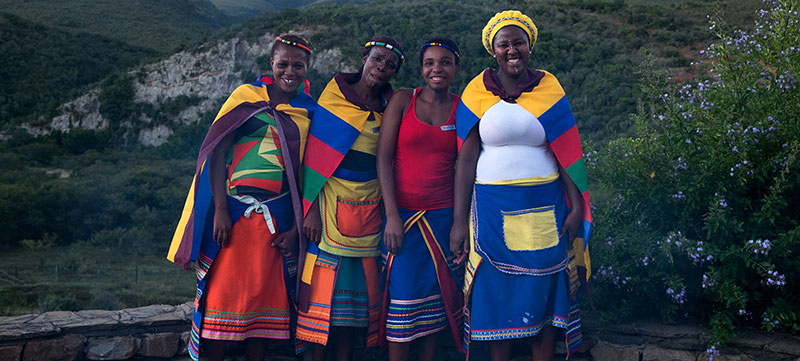GET SOME (XHOSA)CULTURE ON YOUR EASTERN CAPE HOLIDAY
Wednesday, 2nd January 2019
The Eastern Cape is the ancestral home of the Xhosa people, a home of rolling green pastures, Nguni cows and beautifully painted circular huts. The culture of the South African Xhosa people is one with a fascinating oral history, vibrant heritage and strong ties to their ancestors.

ALL ABOUT XHOSA
TRADITIONAL DRESS:
There are few things as uniquely South African as our many tribes in their traditional dress and there is possibly none more vibrant than the Xhosa. Traditionally, women’s clothing represents the different stages of life and usually features long skirts in beautifully printed fabrics, elaborate beaded necklaces, bracelets and anklets. A headscarf (iqhya) is worn by married women. Historically, Xhosa men filled the role of warrior, hunter and stockman and animal skin formed an important part of their traditional wear.
FOOD & DRINK:
Historically, the Xhosas are a farming people and both farmland and livestock (cattle) are important and a sign of wealth. Traditional food and drink includes:
- Beef (Inyama yenkomo), mutton (Inyama yegusha) and goat meat (Inyama yebhokwe)
- Sorghum, mielie-meal, samp and vegetables such as beans, rhabe, and imvomvo
- Fermented milk (amasi) and Umqombothi beer
LANGUAGE:
The Xhosa people speak isiXhosa, a language rich in idioms, respectful addresses and names with special meanings. Spoken as a first language by 8.2 million South Africans, the language has three distinct clicking consonants:
The dental click: “C” (press the tip of your tongue against your front teeth and withdraw it sharply, at the same time dropping the back of your tongue from your soft palate)
The palatal click: “Q” (press the tip of the tongue against the front palate and withdraw it sharply, at the same time dropping the back of your tongue from your soft palate)
The lateral click: “X” (place the tip of the tongue against the hard palate as though to produce the letter “N” and one side of the tongue against the side of the jaw, Then, without shifting the tip of the tongue, sharply remove the side of the tongue from the jaw)
GIVE IT A TRY!
SOME SIMPLE PHRASES AND COURTESIES TO HELP YOU ON YOUR WAY:
“Molo” – Good Morning
“Molweni” – Good Morning (to more than one person)
**It’s customary for the person who enters the room/approaches to greet first**
“Kunjani?” - How are you?
“Ndiphilile, Unjani wena?” – I’m fine, and you?”
**Always speak to someone with respect and refer to them by a title (which is largely dependent on their age): Tata (Father), Bhuti (Brother), Sisi (Sister), Mama (Mother), Makhulu (Auntie), Malume (Uncle), Gogo (Grandmother)**
“Uxolo” – Sorry/Excuse me
“Enkosi” – Thank you
“Enkosi Kakhulu” – Thank you very much
**It is considered impolite to whisper, this implies that you are gossiping about someone**
DID YOU KNOW? World-renowned humanitarian and human rights activist, Nelson Mandela was, and still is, our most beloved Xhosa. He was born in the village of Mvezo, in Mthahta on the Wild Coast of the Eastern Cape, and was laid to rest at the family homestead of his childhood home. The official Nelson Mandela Museum, celebrating the life of our Madiba, can be visited in Mthatha and, according to his wishes, is a living memorial to his values and vision.
DID YOU KNOW? The Wakandan language of the Hollywood film, Black Panther may be from a ficticious country, but it’s actually isiXhosa. Adopted as the official language of Wakanda, you can hear the lyrical language spoken clearly in certain scenes of the film. Watch a scene below:
DID YOU KNOW? Famous Xhosa South African, Trevor Noah, host of the United States talkshow, The Daily Show, lent his voice to the film, Black Panther. Although he speaks in English with an accent, he voices an artificial intelligence system, Griot, on a Wakandan jet at the height of the film’s fighting scene.
